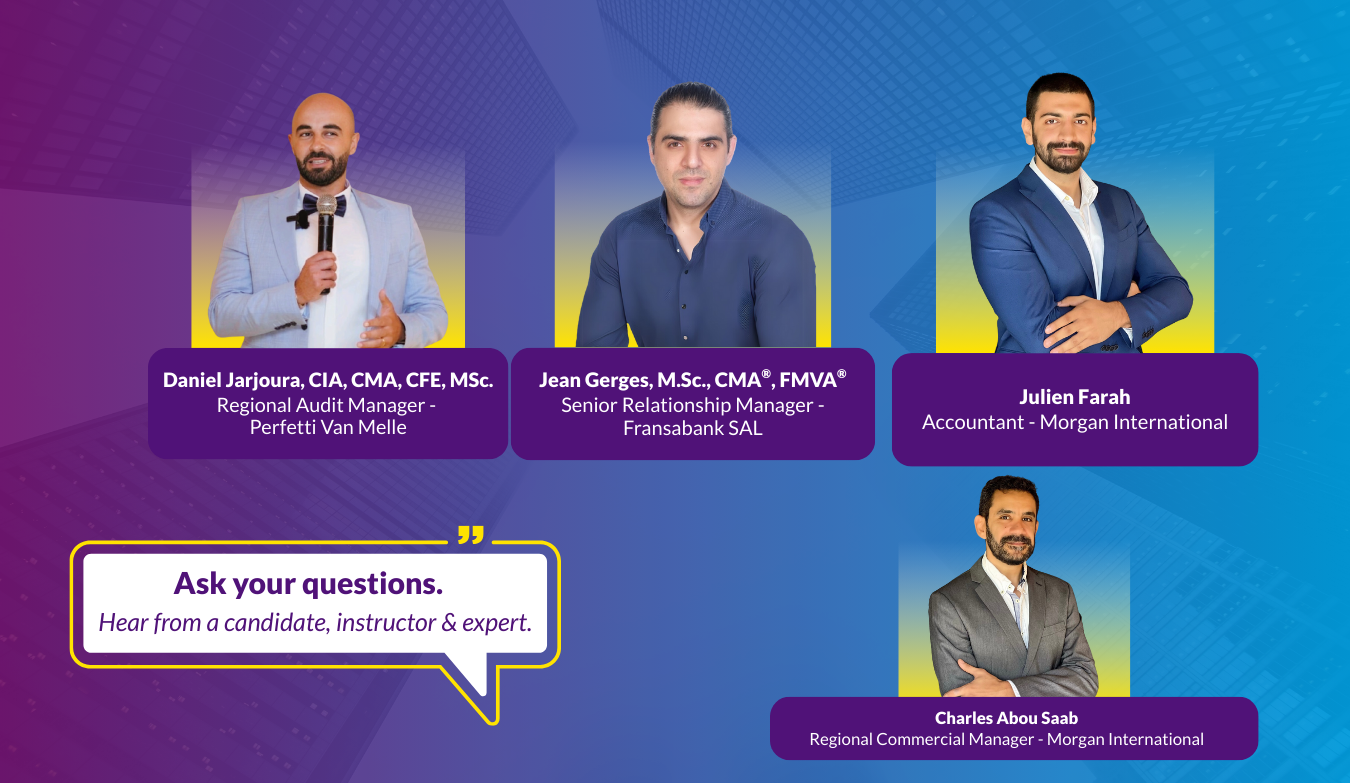The path to becoming a Certified Management Accountant (CMA) is no small feat. It requires time, strategy, and determination. To shed light on what the CMA journey truly looks like, Morgan International hosted a special live session titled “CMA Deep Dive: Live Answers from the Inside.” to tackle all CMA FAQs. Moderated by Carly Aziz, Digital Marketing Specialist at Morgan International, the session brought together a dynamic mix of speakers:
- Daniel Jarjoura: CMA, CIA instructor and Regional Audit Manager at Perfetti Van Melle, Luxembourg.
- Jean Gerges: CMA alumnus, Senior Relationship Manager at Fransabank, with 15+ years’ experience in corporate banking.
- Julien Farah: Accountant, currently preparing for his CMA Part 2 Exam.
- Charles Abou Saab: Regional Commercial Manager and program advisor at Morgan International.
Together, they answered pressing CMA FAQs (frequently asked questions) and concerns our community shared, providing a comprehensive and honest look into CMA prep, career impact, and study-life balance.
CMA FAQs Highlights
Q: Should I start with CMA Part 1 or Part 2?
Daniel Jarjoura: “Honestly, there’s no universal answer. Some say Part 2 is easier, but that depends on your strengths. Personally, I started with Part 2 and finished each part in four months. Whether it’s Part 1 or Part 2, just start with the one you’re most comfortable tackling first. The key is commitment to the bigger goal.”
Q: I’m working full-time in banking. How many hours should I set aside weekly to pass both parts?
Daniel Jarjoura: “When I was working in internal audit, I managed to study 1–2 hours on weekdays and 5–6 hours on weekends. With consistency and focus, you can pass each part in about four months. Realistically, 8 to 12 months is enough for most dedicated candidates.”
Charles Abou Saab added: “The general recommendation is around 100–120 hours per part. But again, your pace, background, and availability all play a role. We’ve seen candidates pass in as little as eight months.”
Q: How did the CMA impact your daily job after certification?
Jean Gerges: “It elevated how I think and operate. I no longer just process numbers—I understand them strategically. From balance sheet analysis to budgeting, the CMA curriculum is applied daily in my work.”
Daniel Jarjoura added: “It gave me the confidence and skills to move from local to multinational companies. The CMA is not magic, but it shows you’re serious about growth. That made me stand out when applying for roles.”
Q: Is it possible to maintain work-life balance while studying?
Jean Gerges: “Absolutely. The magic word is consistency. I studied two hours daily, even with a job, kids, and hobbies like tennis. If your day is full, wake up earlier. It’s all about smart time management.”
Daniel Jarjoura added: “You don’t need to give up your life. What matters most is not how much you memorize, but how well you understand. The CMA is not just about passing—it’s about applying.”
Q: What does the CMA prep look like from a current candidate’s perspective?
Julien Farah: “It’s tough but rewarding. I use a structured plan and Becker’s study planner to keep me on track. The biggest challenge is staying consistent. Time management and discipline helped me push through.”
Q: Are Becker materials enough to pass the exam?
Julien Farah: “Yes. The practice MCQs and simulations are very similar to the real exam. Practicing consistently with the provided material helped me feel confident on exam day.”
Q: What was the hardest part of preparing for the CMA?
Julien Farah: “Staying consistent over several months and managing time during the actual exam. Practicing full mock exams under timed conditions was key to overcoming this. Content-wise, variance analysis and cost management were challenging at first, but consistent review made a difference.”
Q: What are the most common study mistakes CMA candidates should avoid?
Daniel Jarjoura: “Thinking it’s about memorization. The CMA is not like a university exam. You need to understand concepts, think analytically, and apply knowledge. Memorization might help in the short term, but it won’t carry you through the exam or your job.”
Q: What should I focus on when preparing with Becker or any other tool?
Julien Farah: “Create a structured plan and stick to it. Use the study planner. Practice under timed conditions. The MCQs and essays simulate real exam pressure. Also, revisit difficult topics regularly until they become second nature.”
Q: Is the CMA certification recognized globally, and can it help me work abroad?
Daniel Jarjoura: “Definitely. The CMA is an internationally recognized certification, which made it easier for me to transition from Lebanon to Luxembourg. It shows employers worldwide that you have a strong grasp of strategic financial management, which is valued across industries.”
Charles Abou Saab added: “We’ve seen many candidates use the CMA to launch careers in the Gulf, Europe, and North America. Employers in multinational companies know the CMA and respect what it stands for. It absolutely opens doors internationally.”
Final Thoughts
From seasoned professionals to current candidates, the consensus is clear: the CMA is a journey of personal and professional growth. The secret? Consistency, smart time management, and a mindset focused on understanding rather than memorization.
Whether you’re considering the CMA, already preparing, or somewhere in between, the insights from this live session serve as a reminder that with the right plan and commitment, success is absolutely within reach.

